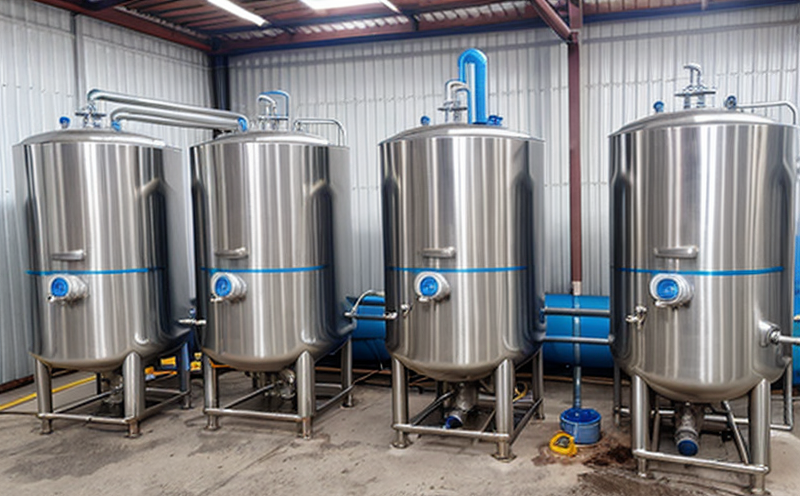ASTM D5673 Mercury Test in Boiler Water
The ASTM D5673 standard method is a critical tool used by quality managers, compliance officers, R&D engineers, and procurement professionals to ensure that boiler water systems are free from harmful contaminants. Specifically, this test focuses on detecting the presence of mercury, which can be highly toxic even in minute quantities. Mercury contamination in boiler water can lead to severe corrosion issues, impacting both the longevity and operational efficiency of the system.
The test procedure outlined by ASTM D5673 involves several key steps that ensure accurate measurement of mercury content. The process begins with a thorough sampling of the boiler water, which is then prepared for analysis in accordance with the standard's requirements. Once the sample is ready, it undergoes a series of chemical and instrumental analyses designed to detect even trace levels of mercury.
The precision and reliability of ASTM D5673 make it an indispensable tool for industries that rely heavily on boiler water systems. By adhering strictly to this method, organizations can maintain compliance with environmental regulations while also safeguarding their assets from costly corrosion damage. The test results are typically reported in parts per billion (ppb), providing a clear and quantifiable measure of mercury contamination.
In addition to its role in maintaining boiler water quality, the ASTM D5673 test plays a crucial part in preventing broader environmental impacts. Mercury vapor released into the atmosphere from improperly managed boiler systems can contribute significantly to air pollution. By ensuring that boiler water is free from this contaminant, the industry can help mitigate such risks.
The standard also emphasizes the importance of regular monitoring and maintenance of boiler systems. This ongoing effort ensures not only compliance but also the longevity of critical infrastructure. Regular testing helps identify potential issues early on, allowing for proactive interventions before they escalate into more serious problems.
For those responsible for quality assurance in industrial settings, understanding the nuances of ASTM D5673 is essential. It provides a structured approach to managing mercury contamination within boiler water systems, thereby enhancing overall operational efficiency and safety standards.
| Sample Preparation | Analytical Methods | Acceptance Criteria |
|---|---|---|
| Sampling location: Main boiler feedwater line or return water line. Sampling frequency: Weekly or monthly depending on system size and operational parameters. | Gravimetric method, cold vapor atomic absorption spectroscopy (CV-AAS), or inductively coupled plasma mass spectrometry (ICP-MS). | Mercury concentration should not exceed 1 ppb for optimal boiler water quality. |
| Ensure that the sample is representative of the entire system. Avoid contamination during sampling and handling. | The chosen method must be validated against certified reference materials to ensure accuracy. | If mercury levels are found above 1 ppb, corrective actions should be initiated immediately. |
In conclusion, ASTM D5673 provides a robust framework for detecting mercury in boiler water, ensuring that industrial operations remain compliant with environmental regulations while protecting valuable assets from corrosion. Regular application of this test is crucial for maintaining high standards of quality and safety across various sectors.
Benefits
The implementation of ASTM D5673 Mercury Test in Boiler Water offers numerous benefits to industrial facilities, particularly those operating large-scale boiler systems. These advantages extend beyond mere compliance with regulatory requirements to encompass significant operational improvements and cost savings:
- Enhanced Compliance: Ensures strict adherence to environmental regulations regarding mercury content in boiler water.
- Prolonged Equipment Life: By eliminating harmful contaminants like mercury, the lifespan of boilers and related equipment is extended significantly.
- Improved Operational Efficiency: Cleaner boiler water leads to more efficient heat transfer processes, reducing energy consumption and operational costs.
- Reduced Maintenance Costs: Fewer instances of corrosion mean less frequent maintenance downtime and lower repair expenses.
- Better Environmental Impact: Prevents the release of mercury into the environment through flue gas emissions.
- Increased Safety Levels: By reducing potential hazards associated with mercury exposure, worker safety is enhanced.
In summary, adopting ASTM D5673 not only helps meet regulatory expectations but also contributes to a safer and more efficient industrial environment. It serves as an investment in long-term sustainability and operational excellence.
Industry Applications
| Industry Sector | Application Details |
|---|---|
| Power Generation | Main boiler feedwater lines, return water systems for steam turbines. |
| Mining | Boiler systems used in processing plants to minimize mercury contamination from ore. |
| Pharmaceuticals | Steam sterilizers and autoclaves where high purity steam is essential. |
| Petrochemicals | Boilers that supply process steam for refining operations. |
| Food & Beverage | Critical boilers used in pasteurization processes to ensure food safety. |
| Manufacturing | Large-scale industrial boilers used across various production lines. |
The ASTM D5673 Mercury Test is particularly relevant for industries where boiler water quality has a direct impact on product integrity, operational efficiency, and environmental compliance. By ensuring that these systems are free from mercury contamination, the standard supports sustainable practices across multiple sectors.
Why Choose This Test
Selecting ASTM D5673 for testing boiler water is a strategic choice that offers several advantages over other methods:
Precision and Reliability: The standard provides detailed protocols ensuring accurate measurement of mercury content, even in trace amounts.
Regulatory Compliance: Ensures adherence to international standards like ISO, ASTM, EN, IEC, which are widely recognized across the globe.
Cost-Effective Solutions: Early detection and intervention through regular testing can prevent costly repairs and replacements of damaged equipment.
Operational Excellence: Cleaner boiler water results in improved efficiency and reduced energy consumption.
Eco-Friendly Practices: By minimizing mercury emissions, the standard supports sustainable industrial practices aligned with environmental goals.
Expertise and Support: Partnering with accredited laboratories ensures access to experienced professionals who can provide guidance throughout the testing process.
In summary, choosing ASTM D5673 for your boiler water testing needs not only meets regulatory requirements but also enhances operational efficiency, reduces costs, and promotes environmentally responsible practices.





